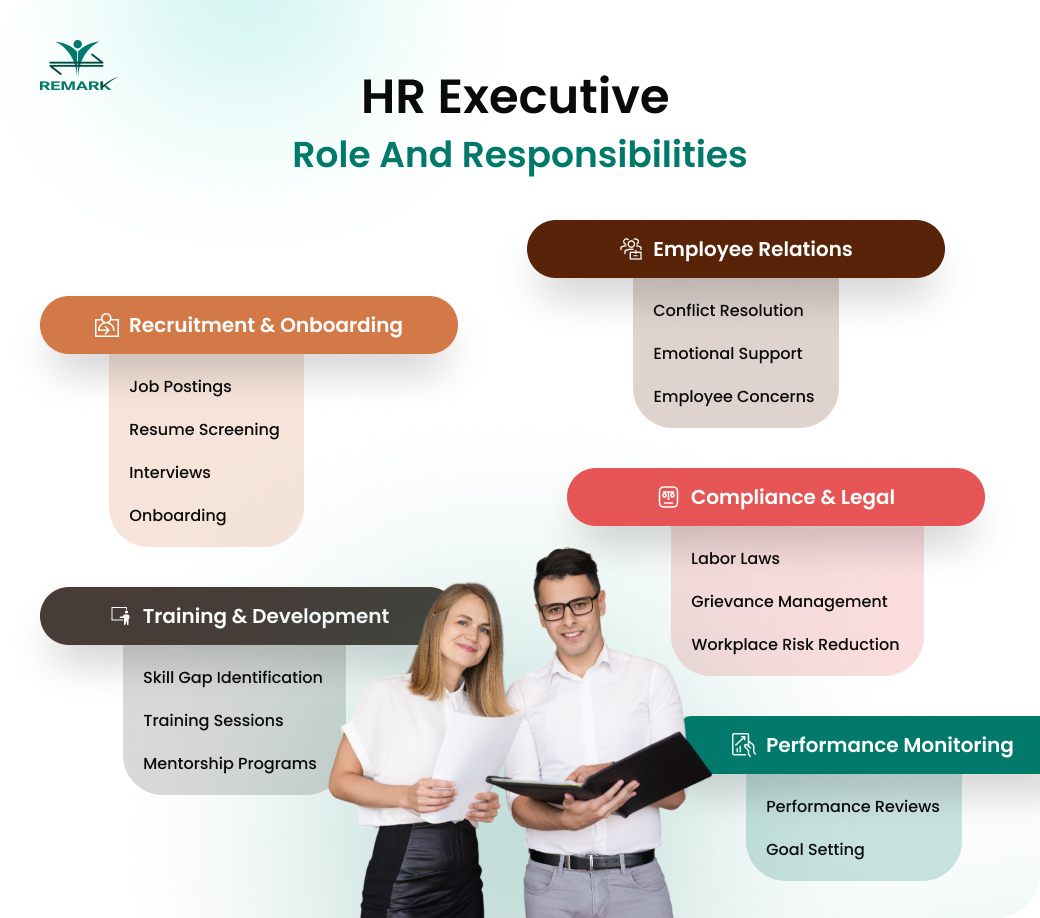Behind every successful team, there’s someone ensuring everything runs smoothly, people feel heard, and systems stay in sync, that powerhouse is no one else but the HR Executive. This professional plays a vital role in shaping the work culture, maintaining compliance, and streamlining the hiring process. But what exactly do they do? Whether you’re planning to apply for the position or want to understand the HR executive job description for resume purposes, this guide breaks it down in a simple and approachable manner.

Let’s explore what it truly means to step into this position, especially in today’s fast-evolving workplaces.
What Does an HR Executive Actually Do?
Imagine someone who wears many hats such as a recruiter, mentor, mediator, compliance officer, and even event planner. That’s essentially the role of an HR professional in most organizations.
They are Responsible for:
- Include recruitment employee onboarding
- Employee engagement initiatives
- Ensuring compliance with labour laws
- Maintaining and updating HR records
- Managing HR software and employee databases
- Supporting employee performance evaluations
- Driving internal communication and fostering a positive work environment
- Supervising payroll, benefits, and leave administration
- Understanding and applying laws and regulations
- Collaborating with leadership for policy planning
This is especially true in startups, where the HR executive job description startup version requires one to be even more flexible and adaptive. From setting up the first employee handbook to hosting team-building events, their touch is everywhere.
Responsibilities That Make a Difference
At the core, the responsibilities of an HR executive revolve around people and processes. Their day typically involves:
1. Recruitment & Onboarding
They handle job postings, screen resumes, schedule interviews, and onboard new hires. A good HR ensures every new employee feels welcome and well-informed.
2. Managing Employees & Records
Tracking attendance, updating personal files, and maintaining accurate employee data is a crucial part of their job.
3. Employee Relations
They resolve conflicts, provide emotional support, and create a space where employees can voice concerns comfortably.
4. Training & Development
They identify skill gaps and coordinate training sessions or mentorship programs.
5. Performance Monitoring
Assisting team leads with employee performance reviews and goal-setting to ensure continuous improvement.
6. Compliance & Legal
An HR professional ensures the company abides by local and national labour laws, manages grievances, and reduces workplace risk.
Frequently Asked Questions (FAQ)
01.What does an HR executive do daily?
An HR executive’s daily duties include recruitment, employee record maintenance, coordinating interviews, answering employee queries, ensuring compliance with labour laws, and supporting team leaders in performance tracking.
02.What qualifications do you need to become an HR executive?
A bachelor’s degree is often the minimum requirement. However, a master’s degree in human resources management adds credibility and is preferred for senior roles.
03.Is HR executive a good career?
Yes! It’s a stable, people-centric role with opportunities for growth into strategic leadership positions like HR manager, director, or even chief HR officer. The demand for empathetic and organized professionals continues to rise.
04.What are the top skills needed for this role?
Along with organizational abilities and knowledge of hr functions, top skills include excellent communication and interpersonal skills, time management, decision-making, and adaptability.
05.What’s the difference between an HR executive and an HR manager?
An HR executive typically implements policies and handles day-to-day operations. The manager, on the other hand, creates policies, oversees the HR team, and handles strategic planning.
06.Can I work in HR without a degree?
While some startups may offer opportunities based on experience and soft skills, having a formal degree gives you a competitive edge, especially in large organizations.
07.What is the salary of an HR executive?
In India, an entry-level HR executive earns between ₹2.5 – ₹4.5 LPA, while a senior HR executive job description may include leadership responsibilities with salaries upwards of ₹6 LPA.
08.How can I make my HR executive resume stand out?
Highlight your contributions in areas like employee engagement, conflict resolution, and your role in improving hr management systems or hiring process optimization.
Senior HR Executives: What Sets Them Apart?
When someone progresses to a senior HR executive job description, the scope of responsibilities deepens. They step into more strategic roles, advising top management, designing compensation structures, planning succession, and implementing diversity programs.
Their decisions influence not just daily operations but also long-term organizational health.
Educational Background and Skills Required
Typically, companies look for candidates with a master’s degree in human resources management or equivalent experience. But degrees aside, the soft skills matter just as much.
Must-have skills include:
- Excellent communication and interpersonal skills
- Problem-solving ability
- Conflict resolution
- Strategic thinking
- Time management
- Tech-savviness with modern HR software
The Importance of HR in Startups vs. Corporates
In a startup, HR plays a foundational role, building processes from scratch, creating policies, and helping shape the culture. The executive job description in this setting may involve everything from handling payroll to organizing weekly check-ins.
In contrast, large companies offer a more segmented approach. The HR executive may focus on a single vertical, such as talent acquisition or training and development, reporting to multiple department heads.
Both require adaptability, but startup life demands hustle and flexibility, while corporates need precision and scalability.
Conclusion
Being an HR executive is more than just handling paperwork, it’s about people, potential, and progress. From building welcoming work environments to driving performance and ensuring smooth internal operations, they are essential to any organization’s backbone, and no organisation can run without HR.
If you’re looking to hire, be hired, or explore careers in human resources, whether in a bustling startup or a growing corporation, Remark by Visko HR is India’s first and most trusted AI-powered platform to match talent with the right opportunities. With advanced tools, curated job listings, and insights tailored to modern hiring needs, Remark brings efficiency and empathy together. So don’t wait and start exploring the infinite career possibilities today. Log in to the Remark portal now!
